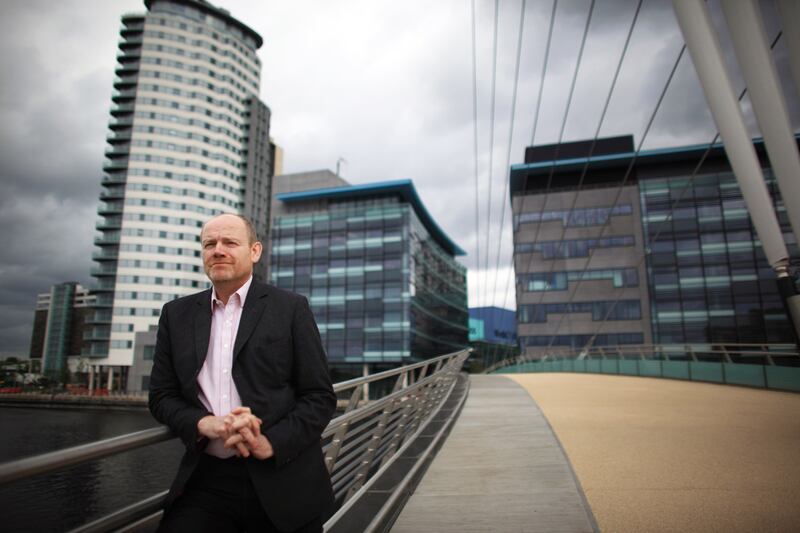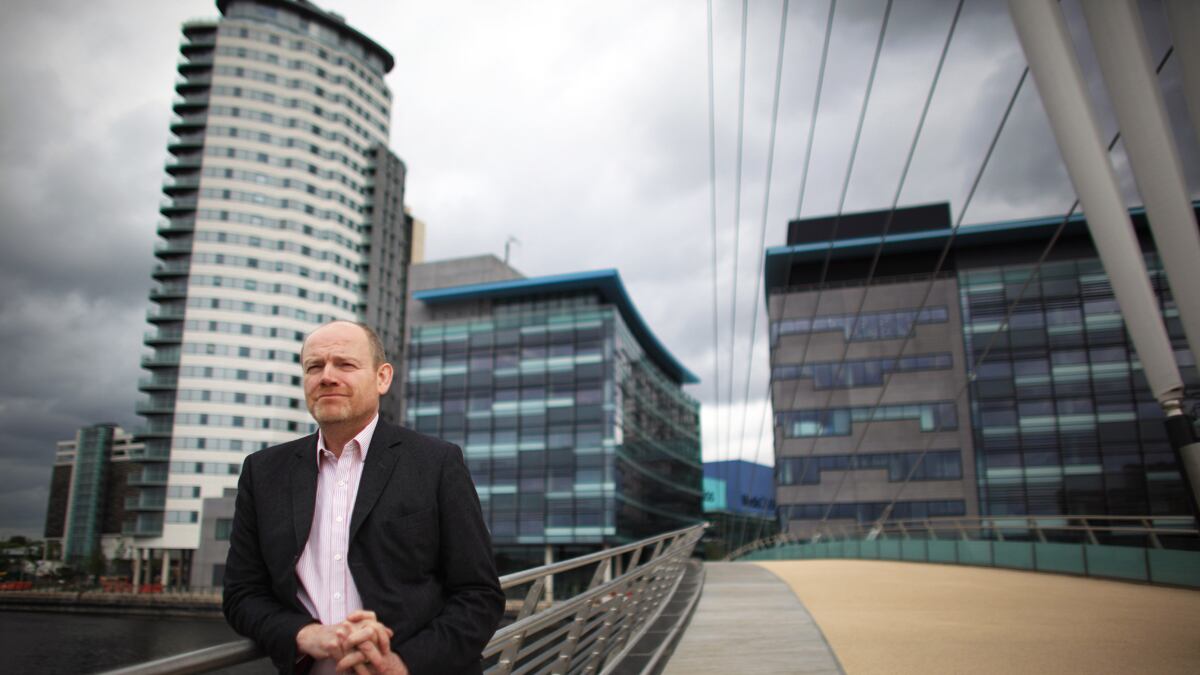In an industry battered by declining revenues and sagging readership, the New York Times has had a good few months. Its circulation figures, which include digital-only subscriptions, are up by an impressive 40 percent over last year. After 18 months of negotiations, management’s roiling labor dispute with The Newspaper Guild has been solved “in concept,” according to Times executive editor Jill Abramson. And the paper provoked the ire of the Chinese government—and the accolades of its peers—with the publication of a blockbuster investigation into the vast personal wealth of Prime Minister Wen Jiabao.
But it’s not all sunshine for the Times. As expected, print circulation is down substantially and advertising revenue dropped 8.9 percent in the last quarter alone. And looming in the background, causing trepidation amongst staffers and investors, is the issue of Mark Thompson.
Thompson is set to become the CEO of The New York Times Company on Nov. 12, with various media reports suggesting he could earn upwards of $5 million in his first year at the helm. But many are now wondering if he is the right man for the job. The former BBC director general is embroiled in spectacular scandal in his native United Kingdom, a story that has so consumed the British media that John Simpson, one of the corporation’s most famous faces, declared it “the worst crisis that I can remember in my nearly 50 years at the BBC.”
A rough précis of the increasingly complex scandal: BBC presenter Jimmy Savile, who died last year at age 84, is alleged to have sexually assaulted hundreds of woman and underage girls, which some have claimed was an open secret at Broadcasting House. Soon after his death, the BBC’s program Newsnight was set to air an investigation detailing horrifying allegations of rape and pedophilia against Savile. But for reasons that are still unclear, higher-ups intervened and the program was dropped. Who intervened—and why—is a matter of furious debate.
Thompson, then the top man at the BBC, claims to have known nothing of the Newsnight investigation and, therefore, was in not involved in spiking the Savile segment. But Thompson’s line on what he knew and when has been modified, shifted, and qualified since the story broke. (See The Daily Beast’s previous coverage of Thompson’s seemingly contradictory account of the Savile timeline here.) But new allegations in London’s Sunday Times suggest Thompson’s office was twice contacted about the Savile investigation by a freelance journalist last April. Thompson claims this information languished on his secretary’s desk, never reaching his ears, a defense that has provoked renewed scrutiny of his role at the Times. As New York magazine writer Joe Hagan put it, if conclusive evidence surfaces that “Thompson had prior knowledge of the BBC report on Savile, the Times’ reputation would be damaged, not least because of its own tough reportage on molestation cover-ups inside the Catholic church and at Penn State.”

Before these most recent revelations, Times publisher Arthur Sulzberger offered a full-throated defense of his incoming CEO, saying Thompson “possesses high ethical standards and is the ideal person to lead our company.” And while it was unsurprising that Times public editor Margaret Sullivan questioned his fitness to run the company (“What are the implications for the Times Company to have its new CEO—who needs to deal with many tough business challenges here—arriving with so much unwanted baggage?”), these compounding claims of prior knowledge provoked Times columnist Joe Nocera to write that his soon-to-be boss was “willfully ignorant” of the Savile scandal, a stance that “makes you wonder what kind of an organization the BBC was when Thompson was running it.” And, by extension, what type of organization the Times would be if Thompson took the reigns.
As is often the case in the British media, the lurid Savile allegations have migrated from the red tops to the broadsheets with ease, while retaining all of their salaciousness (a “powerful pedophile network linked to Parliament and Number 10;” Savile accused of “necrophilia”). And it should be noted that Thompson is greatly handicapped by making the always unpopular decision of seeking an even bigger fortune in America.
British journalist and novelist Jeremy Duns, who has written extensively on journalistic ethics scandals, says that in the United Kingdom, the press often gives management a more difficult time than journalists. The disgraced journalist Johann Hari, who worked as a columnist at The Independent newspaper until he was (reluctantly) fired for plagiarism, is “re-employed as a journalist,” he told The Beast, while “the reputations of The Independent managers who ignored obvious problems with his work and then failed to look at it properly have taken a major hit.”
But while the knives are out for Thompson in the British media, some of his former colleagues at the BBC are standing by him. John Ware, a highly-respected BBC journalist who worked with Thompson at Panorama, the network’s longest-running documentary program, told The Daily Beast that his former colleague “would never have countenanced covering up what we now know about the scale of Savile’s conduct. He just wouldn’t.” Thompson, Ware says, would never have turned a blind eye to such sinister accusations. “Mark is a practicing Catholic. He would not have been complacent about this. He would have taken no prisoners on this story if he’d known the scale.”
The Times’s Margaret Sullivan expressed deep skepticism that someone so powerful at the BBC could lack knowledge of a major internal investigation of one of its premier stars, writing that such ignorance was “highly unlikely.” But Ware says that it is, in fact, “highly likely” that Thompson would have been unaware of the Savile story. “The BBC is vast,” he told the Beast. “There are a zillion stories at multiple levels churning around every day of every week or every year.”
Ware says it would be a major loss for the Times if it cuts ties with Thompson. But the drip, drip, drip of damaging information and shifting timelines might yet have a fatal impact on Thompson’s new career. His own newspaper has promised vigorous coverage of the story—and has fulfilled the promise, often to a point of absurdity. As Thompson himself has said, the reporters assembled by The New York Times are “the envy of the world.” And as his future with the newspaper hangs in the balance, there is the very real possibility that his leadership will be cut short—or made deeply unpleasant—by the diligence of his own staffers.





